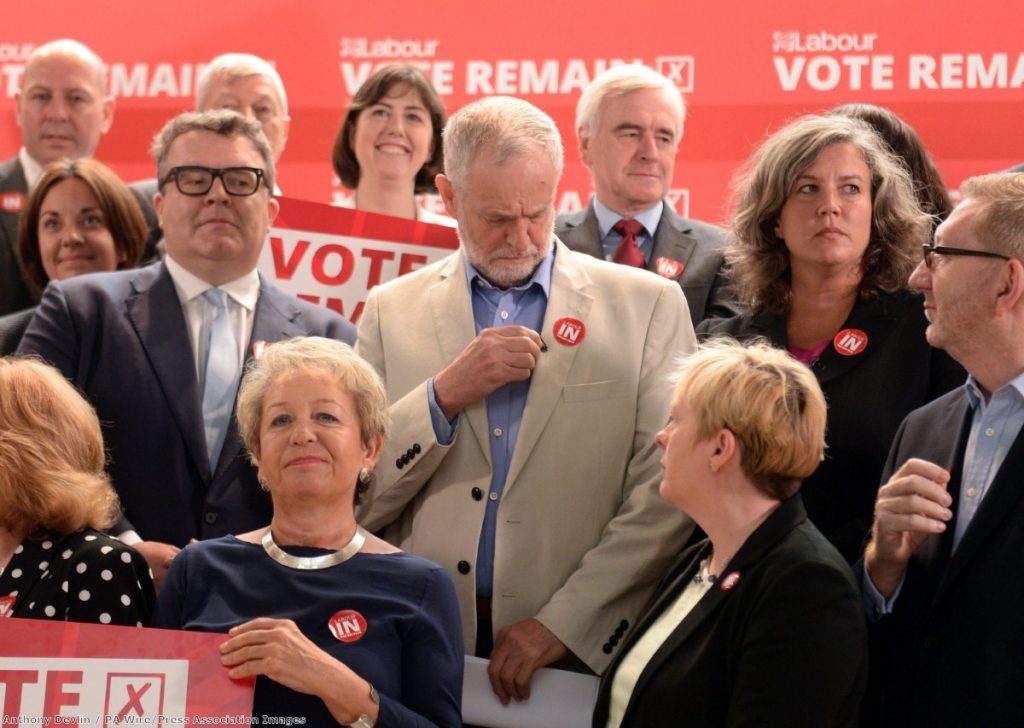Angela Eagle said today that she is prepared to "resolve" the Labour leadership crisis within the next few days if Jeremy Corbyn refuses to stand down.
She told the BBC: "There are many people: MPs, party members up and down the country [who are] asking me to resolve this impasse and I will if something isn't done soon."
While it's clear that Eagle does have the ability to trigger a leadership election, it seems highly unlikely that this would actually "resolve" the crisis. It's even less clear it would do so in a way that she and her colleagues would like.
In fact, the immediate impact of a new leadership election process would be to actually strengthen Corbyn's position within the party. Over the past week Corbyn has suffered the resignation of almost every senior Labour MP from his frontbench, along with an overwhelming vote of no confidence in his leadership. By any normal standard, his leadership is untenable. With dozens of positions vacant from his shadow cabinet, it is obvious to any impartial observer that he is no longer able to lead either his own party, or the official opposition to the government.
Yet if Eagle, or alternatively former shadow work and pensions secretary Owen Smith, were to trigger a leadership election it would bring the immediate question of Corbyn's day-to-day leadership to a close. The process of holding a new election would overshadow the practical obstacles to Corbyn remaining. As long as Corbyn were allowed on the ballot paper, he would be the overwhelming favourite to win. Corbyn would be returned as leader with a fresh mandate.
On the face of it Corbyn would be strengthened, but the crisis would not be resolved. Instead, after several months of incredibly damaging infighting, Labour would be returned pretty much to where it started.
So how else could Labour's crisis come to an end? Of course Labour MPs could decide to make peace with their leader. This is vanishingly unlikely. Once confidence in a leader has been lost, it can't magically return. Alternatively they could break away and form a new party. Yet rather than resolving Labour's crisis, this would risk killing off the Labour movement as a going concern.

Labour faces a potential split of the party
There is another alternative. Labour's NEC could decide that all candidates, including the incumbent, would require the nominations of 20% of MPs and MEPs in order to get on the ballot. Labour party rules are highly ambiguous on this point and the courts are unlikely to be willing to get involved. But if Labour's ruling committee did decide to do this then it would effectively rule out Corbyn from standing again.
There would be some convincing logic to doing this. We live in a parliamentary democracy and the leader of the opposition needs to be in a position to lead both his party and a potential government. The current situation where shadow ministers are doing two or even three jobs at the same time is damaging for both Labour and the country. If Corbyn's MPs are unwilling to serve under him then there is a strong argument that any new leadership bid would be invalid.
But blocking the current leader of the party from fighting a leadership challenge just ten months after party members gave him an overwhelming mandate, would cause the biggest crisis for the Labour party since it was founded. It would be viewed both by members and by the wider public as an illegitimate and undemocratic coup against an elected leader. It would make a mockery of Labour's claims to be a mass movement party and cause an immediate split.
Could the party survive this? It's possible. There are many Labour MPs who believe that while they would be damaged, they would at least be in a position to rebuild under a new leader.

Jeremy Corbyn won an overwhelming mandate just ten months ago
But the truth is that there are no good options left. If Labour MPs do nothing, Labour will limp on damaged and rudderless to heavy defeat in the next general election. If they stand against him, the same outcome is likely. But if they block him, Labour faces a damaging split and the potential death of the party as a going concern.
The only outcome which just might avoid these disasters would be if Corbyn were to voluntarily stand down. Yet ten days into the crisis and there's little sign this is about to happen.
But even if by some miracle Labour could negotiate a relatively benign transition to a new leader, the fallout from the referendum campaign means that Corbyn's successor would immediately face several more crises, each of which risks Labour's demise. The rise of anti-immigration feeling and the widening divide between Labour's industrial heartlands and the metropolitan middle classes that make up the core of Corbyn's support, pose major obstacles to Labour ever getting back into government again. This is before we even consider the upcoming boundary review and the possible break-up of the UK. In many ways the battle to lead the Labour party is a battle to decide who should be the captain of an already sinking ship.
Labour MPs know all this which is why they are so reluctant to actually launch a leadership challenge against Corbyn. Yet doing nothing is not an option. Once Labour MPs began their coup, there was no way back. The party has to now decide a way forward, even if all the available paths lead towards disaster.
Like a game of bluff in which all all the players have blank cards, Labour have no good options left. In this grim form of stalemate, neither side can win, but both sides could heavily lose.





-01.png)